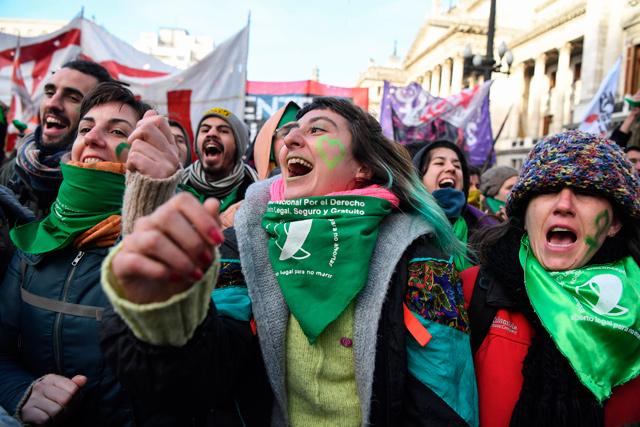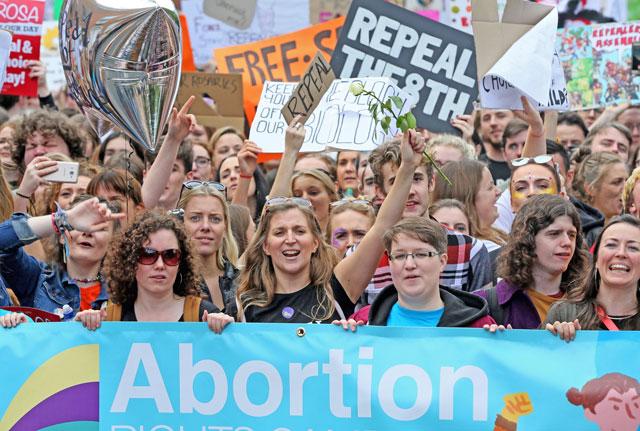You are here
Argentine lawmakers approve bill to legalise abortion
By AFP - Jun 15,2018 - Last updated at Jun 15,2018

Pro-choice activists wait outside the Argentine congress in Buenos Aires, on Thursday, before the approval of a bill to legalise abortion (AFP photo)
BUENOS AIRES — Lawmakers in Pope Francis's native Argentina cast a historic vote on Thursday to legalise abortion during the first 14 weeks of pregnancy, a measure that now awaits senate approval.
Thousands of abortion rights activists cheered and hugged outside the congress as the lower house chamber of deputies passed the bill by 129 votes to 125.
The bill will now go before the senate, where it faces an uphill battle to become law.
The issue has divided Argentine society: while Argentina became the first Latin American country to legalise same-sex marriage in 2010, it remains strongly influenced by the Catholic Church and by the Pope, who was formerly the archbishop of Buenos Aires.
"It's the time of women's rights," said Silvia Lospennato, a member of President Mauricio Macri's centre-right Cambiemos (Let's Change) coalition.
Lawmakers wrangled through more than 22 hours of emotionally charged debate. Nearly all 257 members spoke before the vote was taken, as activists on both sides of the divide kept vigil in the streets outside.
It was unclear up to the last minute if the measure would be approved or defeated. As many as 30 lawmakers were undecided before the debate began on Wednesday, and one lawmaker abstained from voting.
When the result was announced, lawmakers who voted in favour leapt to their feet and hugged their neighbours, while opponents slumped in their seats.
"A woman is not entitled to an abortion, she has the right to health. The unborn child is biologically and scientifically a human being," said Sebastian Bragagnolo, from the governing Cambiemos coalition who opposed the measure.
Luis Pastori, of the Radical Civic Union, said it was "absurd and unjust to sanction a law that enables the killing of human beings that must be respected from the moment of conception".
Street celebrations
In the streets outside the congress abortion rights activists wildly cheered and danced, while many anti-abortion demonstrators hugged each other and wept.
"The mobilisation has been decisive and what happens in the senate will depend a lot on continuing to mobilise public support," Teresa Giani, 48, told AFP.
"I think it is very good that they are legislating for the problems of women," said Ines Rivas, 62. When women become lawmakers and enter congress "they defend the rights of women", she said.
"Argentines are religious, and they will continue to be," said Micaela Gonzalez, a 21-year old university student. "Catholics have abortions, but with this law now they will be able to [do] so safely."
Religious convictions
The Catholic Church campaigned fiercely against the bill, and the Pope sent a letter to Argentine bishops calling on them to "defend life and justice”.
Many lawmakers had said they would put their religious convictions aside to support the measure.
Centre-right President Mauricio Macri made it clear from the outset that he was "in favour of life", but encouraged open debate in congress.
As in most Latin American countries, abortion is illegal in Argentina, except in cases of rape or when the life or health of the woman is at risk.
The bill, if passed by the senate, would decriminalise abortion during the first 14 weeks of pregnancy, and beyond that in cases where the infant would not survive after birth.
Argentina overcame strong church opposition to legalise gay marriage eight years ago, but the issue of abortion has never before been discussed in parliament.
According to official health ministry statistics, more than 17 per cent of the 245 recorded deaths of pregnant women and girls in 2016 were due to abortion. NGOs say some 500,000 clandestine abortions a year are carried out every year.
In Latin America, unrestricted abortion is legal in Uruguay, Cuba and Mexico City. In almost all countries, it is available in case of a risk to a woman's life or in cases of rape.
However, a blanket prohibition exists in the Central American states of El Salvador, Honduras and Nicaragua.
Related Articles
BUENOS AIRES — Conservative challenger Mauricio Macri turned Argentine politics on its head on Sunday, kicking the ruling Peronist movement
BUENOS AIRES — Business-friendly conservative Mauricio Macri was sworn in as Argentina's new president Thursday, turning the page on 12 year
DUBLIN — Ireland will hold a referendum on liberalising its restrictive abortion laws at the end of May, Prime Minister Leo Varadkar announc

















